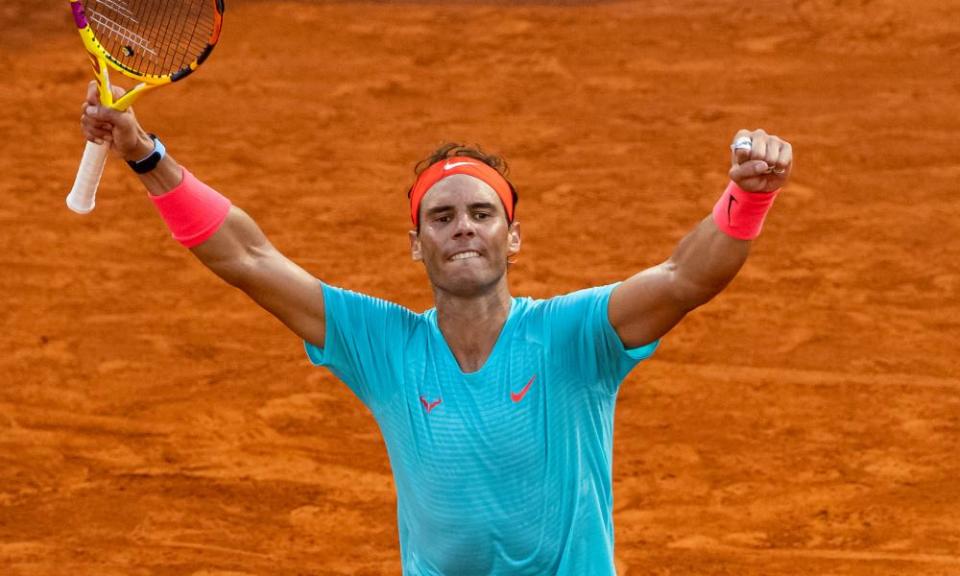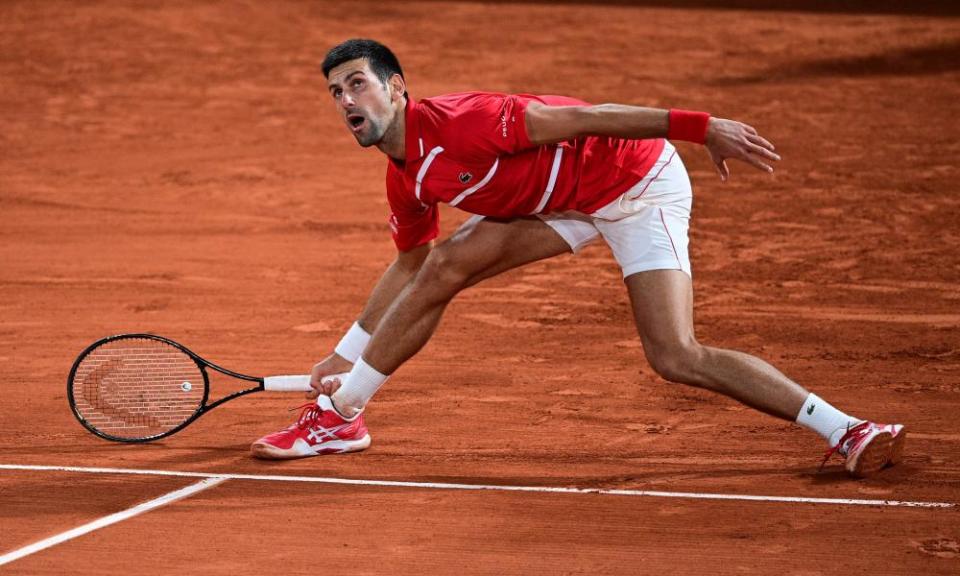Nadal and Djokovic see off spirited challenges to reach French Open final

If Rafa Nadal were to win the French Open for the 13th time in 15 years on Sunday by defeating Novak Djokovic in his 100th win at Roland Garros, the Coupe des Mousquetaires surely should be awarded to the Spaniard in perpetuity.
It is not a notion Nadal would embrace, but beating the world No 1 in the autumn of their rivalry to equal Roger Federer’s all-time record of 20 majors – three ahead of Djokovic – would test even Nadal’s entrenched humility.
Related: French Open semi-finals: Djokovic v Tsitsipas, Nadal crushes Schwartzman – live!
“I live my reality,” he told Spanish journalists. “When we finish, we talk about [Federer’s record]. For me, what matters at the moment is that I will play the final of the most important tournament of the year for me.”
Nadal knows victory is far from a given, even though he has lost only twice at the tournament in 99 matches since his winning debut in 2005 (once to Djokovic) and has yet to drop a set this fortnight. That said, the odds are marginally with a player whose claim to be the greatest clay-courter of them all is not worth even a limply raised hand of dissent.
He survived his toughest test of the tournament in the first semi-final on Friday by holding off the late charge of the 12th seed Diego Schwartzman to win 6-3, 6-3, 7-6 (0) in just over three hours. Djokovic then took his undefeated run in completed matches in 2020 to 37 by quelling the vigorous challenge of Stefanos Tsitsipas 6-3, 6-2, 5-7, 4-6, 6-1 under the roof and lights of Court Philippe Chatrier in just under four hours.
Djokovic, who complained that a neck problem had flared in his quarter-final against Pablo Carreno Busta two days previously, moved well enough but looked tired towards the end of this more exacting five-setter, his longest and most difficult match of the tournament, before bursting into life when it mattered.
“Of course I will bring a lot of passion and try to win on Sunday,” he said courtside, “but he has won so many times here, but he might still have the memory from 2015 when I beat him in the quarter-final. So I have some hope.”
“This was a nice one to win. We were both a bit tired after nearly four hours on court. Stefanos is a great guy, a great player. I have to give him a lot of credit for his effort in this match. I think he will go in a positive direction in his career.”

Nadal said after a semi-final that began as a workout and finished in a dogfight: “You can’t be in the final of Roland Garros without suffering. I made a couple of mistakes tactically and technically. But, in general terms, I am super happy about the match. To win against Diego, you have to work a lot and you have to play well for such a long time. But I found a way.
“Against Novak, I need to play my best. He is one of the toughest opponents possible. But I like to play in this scenario.” If he did not relish the fight, he would probably have lost the third set against Schwartzman, who came from 2-4 down to force the tie-break. But, as the man said, he found a way. He invariably does. In 13 French semi-finals, he has dropped only three sets, a staggering statistic that reflects his growing determination towards the end of the tournament.
Tsitsipas, the world No 6, frightened the life out of Djokovic with a high-grade, focused revival after going two sets down. Like Nadal, Djokovic found an extra gear under pressure. A 93mph forehand down the line in the fourth game of the third set will live in the memory of all who saw it; it is not certain Tsitsipas, idling at the net, did.
Related: Iga Swiatek and Sofia Kenin are polar opposites offering a glimpse of future
However, just as Nadal tightened up near the line, Djokovic butchered match point, handed Tsitsipas the break and could only watch as his young opponent’s withering backhand skimmed the line to take the set. They’re good – but they’re human.
It took all Djokovic’s inner strength to stop Tsitsipas’s run of five games in a row but, after a quiet and artful fightback, he allowed him to level at two sets apiece with a truly limp drop shot.
Djokovic was in genuine trouble – and then, from nowhere, he burst into life to go 5-1 up in the fifth, as a flat-footed and non-plussed Tsitsipas could not respond to a winning mix of power and subtlety at the net. It seemed inconceivable even half an hour earlier that Djokovic would rush through the deciding set so convincingly that his last shot was an almost casual forehand winner down the line.

 Yahoo Sport
Yahoo Sport 





































